Christopher Olivares Martinez Joins Civil & Environmental Engineering Faculty

April 20, 2021 – Christopher Olivares Martinez, an environmental biotechnology expert and environmental justice advocate, has joined the civil and environmental engineering faculty as an assistant professor as of April 1, 2021.
Olivares Martinez’s current research includes environmental biotechnology, remediation, metabolomics, pollutant fate in natural and engineered systems, microbial toxicity and environmental organic chemistry. He is passionate about researching the relationship of microbial processes and pollutants because he sees the biological processes as environmental health indicators. He is deeply concerned with the effect of wastewater and pollutants, particularly on underserved, low-income, minority, undocumented and indigenous communities.
Through his research, Olivares Martinez seeks to uncover the connections among three main areas: microorganisms, pollutants (both legacy/old and emerging/new) and sudden events like wildfires or floods. He explores how they may interact and how communities may be exposed to harmful pollutants.
“We really have to center our work on protecting those who are most affected,” he says. “That’s at the very core of environmental engineering.”
“We are excited to have Chris joining us this spring,” says Sunny Jiang, professor and chair of the Department of Civil and Environmental Engineering. “His research and educational interests bridge environmental chemistry and microbiology for engineering solutions. He is a big advocate for environmental justice. We are looking forward to working with him to build a stronger environmental engineering program at CEE.”
Before arriving at UCI, Olivares Martinez was a postdoctoral fellow at the UC Berkeley Department of Civil and Environmental Engineering, where he studied in‐situ chemical remediation of per‐ and polyfluorinated alkyl substances (PFAS), as well as the impact to microbial bioremediation on co-contaminants. He has also researched water quality impacts from forest fires, and bioremediation and toxicity of munitions compounds.
Olivares Martinez earned a doctorate in environmental engineering from the University of Arizona. He also earned master’s degrees in environmental engineering and French literature and culture.
His numerous awards and fellowships include the United Nations 2019 UNLEASH Innovation Lab Talent - Water & Sanitation, Outstanding Graduate Student 2014, Best Oral Presentation Chemical and Environmental Engineering Graduate Research Symposium, Water Sustainability Program Fellowship 2014-15, National Institute of Environmental Health Sciences Superfund Research Program KC Donnelly Externship Award 2014, NIEHS SRP Trainee Program 2012-2013, 2013-2014 from University of Arizona and Mexican National Council of Science and Technology Fellowship from the University of Arizona College of Engineering.
“The UC system’s mission is really important,” says Olivares Martinez. “Serving the needs of the state for education and research, especially when it comes to the initiatives of diversity, equity and inclusion, those are very important.” He mentions that UCI’s designation as a Hispanic-Serving Institution and the Black Thriving Initiative also “are very needed and very exciting.”
He was drawn to the Samueli School of Engineering because of its nontraditional organization and interdisciplinarity. In fact, “I interviewed the day that UCI shut down, so there was a lot of uncertainty. The flexibility and adaptability were very cool to see.”
Meeting UCI faculty and learning more about the university, Olivares Martinez was excited about the crosstalk and involvement of students at different levels. The faculty’s concern for how research contributes to the society’s good impressed him. “I just felt like a really, really good fit with the current interests and projects of the department.”
Throughout the interview process, he says “I felt welcome as an individual. They asked me about my swimming and painting and saw me as a human being.”
As a lifelong swimmer, Olivares Martinez says, “One of my happiest places is to be immersed in water. Swimming has been a way to have space for myself.”
Growing up in Mexico City, he started swimming at the age of 2. His father felt strongly that Olivares Martinez know how to swim because there had been a local drowning. He has been swimming, even competitively, ever since. And his fascination with water continued through his career: “We all need water to live. It’s the basis of who we are.”
With both parents working as chemical engineers, Olivares Martinez vowed not to follow in their footsteps. They were working with oil refineries, and he only saw chemical engineering as causing problems – specifically pollution.
While initially pursuing his childhood dream of being an astronaut, Olivares Martinez discovered a different path that led him to a much smaller sense of space: the microbe. He was fascinated by the power of such a tiny living thing and how it could dramatically affect people’s lives.
Although his father passed away when Olivares Martinez was 9, he still laughs with his mother about his choice of careers and they joke about how he is “finding the electrons.”

In his spare time, Olivares Martinez paints, enjoying the layering of colors and meditative practice. Inspired by 19th century Spanish painter Joaquín Sorolla’s play with light and water, he still cannot stop thinking about the environmental impact of the materials he works with. “I enjoy creating, but I’m very conscious of the waste that I’m putting out in the world. I’m always thinking about water and pollutants.”
Olivares Martinez is constantly making connections where others may not. His study of French literature and culture simultaneously with his engineering research may seem like disparate disciplines. But Olivares Martinez explains the connection between literary analysis and engineering: “We’re solving problems related to context, time, society and relationships. There are a lot of similarities between scientific breakthroughs and in writing literary works. It’s that spark of unexpectedness.”
Imagine French author Victor Hugo trudging through the sewers of 19th century Paris and writing Les Miserables inspired by what he experienced. Sewers are rich historical sources of information argues Olivares Martinez. “They tell us about what we eat, what we discard, our day-to-day lives.” Today, Olivares Martinez researches and teaches courses on wastewater, where he also explores sewage and what it reveals. He shares an example of environmental engineering’s impact: “developing sanitation – that alone increased human lifespan at least 20 years.”
He’s not afraid to wade into unexpected or unfamiliar waters and hopes to inspire his students and colleagues to do so as well.
As an openly gay Latino male, Olivares Martinez shares that he did not meet any openly LGBTQ professors while he was in school. Even though his advisers were and continue to be very supportive, “It was hard for me to picture a future.”
Olivares Martinez wants to change that for his students at UCI. “It’s important that students see their professors as complete human beings, and hopefully they can also see themselves,” he says. “Visibility is important.”
“My chair Sunny Jiang has been such a great supporter and advocate,” says Olivares Martinez. “She has been wonderful.”
Collaborations are key for the new assistant professor. “With my research, I’m excited to build an interdisciplinary program that takes at the core microorganisms and looking at the analytical chemistry of pollutants as we face new challenges in the 21st century.”
“At UCI, I hope to help students at all levels to form their problem-solving skills – making sure they not only focus on the technical side, but to make sure they don’t lose sight of the human aspect wherever they go,” he says.
“My philosophy about engineering is that engineers ultimately solve human problems.”
– Tonya Becerra
